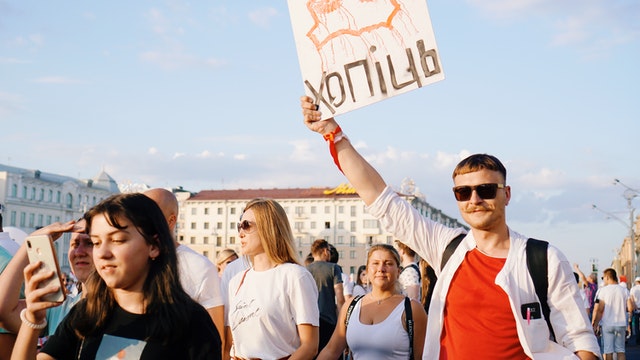
A civilian dictatorship is such a type of government in which authority lies in the hands of political elites. In such a form of government, though the electoral process is fulfilled, the essence of democracy is always compromised. This problem usually occurs in societies where democracy is not mature enough to deliver. In developing countries, the democratic institutions are not so strong to deliver to the masses.
This weak political structure starts from the grass-root level to the upper level of power corridors. Generally speaking, political power revolves around a particular group or a person within the party. In such a scenario, the decision of the party head is above and foremost of all the members.
Such a political system is termed as dictatorship in the disguise of certain political processes. In mature democracies, the notion of civilian dictatorship is such a concept where people always strive to condemn it.
But if we talk about the countries where the concept of democracy is evolving, we can observe a lot of political mess there. In such societies, even though the electoral process is not so transparent, still the political representatives have to accept the decision of their party head.
What is a civilian dictatorship?
A civilian dictatorship involves the presence of political elites who control the government and may have a lot of power
The three general types of dictatorships are:
Nationalist dictatorships
This is the type of dictatorship that claims to protect and defend the “national interest” and rule in the name of the nation’s people. In this type, their major slogan is always for the nation or the masses.
Independence movements
In the independence movement, the leaders normally seek to gain independence from one or more other nations.
Colonial rule
Whereas in the third type of dictatorship the government is in the hands of a minority group of people. They intervene and control the political system of the country. A lot of examples are there where we can give the reference of the colonizers and colonies in the past.
A civilian dictatorship is somehow different from a military dictatorship. Military dictatorship is a phenomenon where political power is misused by the military. On the other hand, in the civilian dictatorship, political power is mainly controlled by the political elites.
How do civilian dictatorships differ from military dictatorships?
Military dictatorships emerge within an existing political order when existing democratic institutions are not working properly. The existing institutions are unable to resist the military due to a variety of reasons. Some of these reasons are internal within the country (lack of coordination between the civilian and the military branches of government), while others are external (the military’s fear of popular uprising).
However, regardless of external or internal reasons, when the military dictatorship fails to maintain the structure of the existing political order, the military dictatorship becomes a civilian dictator regime. Such is the case with the military dictatorship of Ferdinand Marcos in the Philippines.
Is it possible to have an interlude between civilian and military dictatorships?
That is possible but rare. Usually, we get one dictator after another because of a multiplicity of reasons. But more importantly, because civilian democracies in the real world do not survive for more than 30 years. For this reason, a prime minister who does not want to continue as a civilian dictator for very long has a high chance to evolve into a dictator. At the same time, a change in one or several critical levels of government in a democracy is a good opportunity for a leader who has a fraction of the public support that preceded his tenure as a civilian dictator to present a new argument for continuing as a dictator.
The clearest example of such a transition is that of Jean-Bertrand Aristide in Haiti.
Do all civilian dictatorships follow the same trajectory as dominant-party dictatorships?
The short answer: no. Among the political science literature on successful civilian dictatorships, political scientist Christopher Achen has concluded:
Even if the rulers of a civilian democracy act far less accountable to their own political supporters than dictators are accountable to theirs, democracy as a political system is not a suitable safeguard against autocratic degeneration.
According to the Center for Economic and Policy Research, a liberal think tank based in Washington, DC, about 18% of the world’s countries is authoritarian regimes.
Why do personalistic dictatorships fail in the long run?
Apart from human failings (demagoguery, emotionalism, showmanship, personality cults), a dictatorial regime is vulnerable to unforeseen and disastrous crises. Due to the military’s influence in civilian institutions and as officers of the armed forces, they are insulated from the dangers of civilian life. They are more comfortable in military barracks than in mundane everyday life. In short, their regimes are fragile because they are ill-suited to the demands of an open society, so they come and go in the blink of an eye, encountering an unforeseen crisis.
In contrast, dominant-party dictatorships rely on the impartiality of the courts, elected officials, and civil society. Actually, civilian dictatorships take refuge under the umbrella of the democratic process. This type of government is more harmful to the political structure of any society.
Conclusion
Many changes in our government occur or will occur, from a point of view of peace-time or peace-time–as opposed to war–inequality. One consequence is that individual nations can generate wealth but not create democracy and independence. Another consequence is that war can produce conflicts of interest that may require a civilian dictatorship to be created in order to resolve the conflicts.
The button line of this article is that democracy should prevail in its real soul. Vibrant democracy can ensure the protection of basic human rights. Dictatorship comes what may, is harmful for the political institution of any country. There is always a clash of interest in the power corridors. If the political power is under certain constitutions, there are far fewer chances of corruption or misuse of the power. On the other hand, in civilian or military dictatorships, the power of decision is in the hands of a small group or a person. So the decisions made by these elites can not be the voices and choices of the masses.



